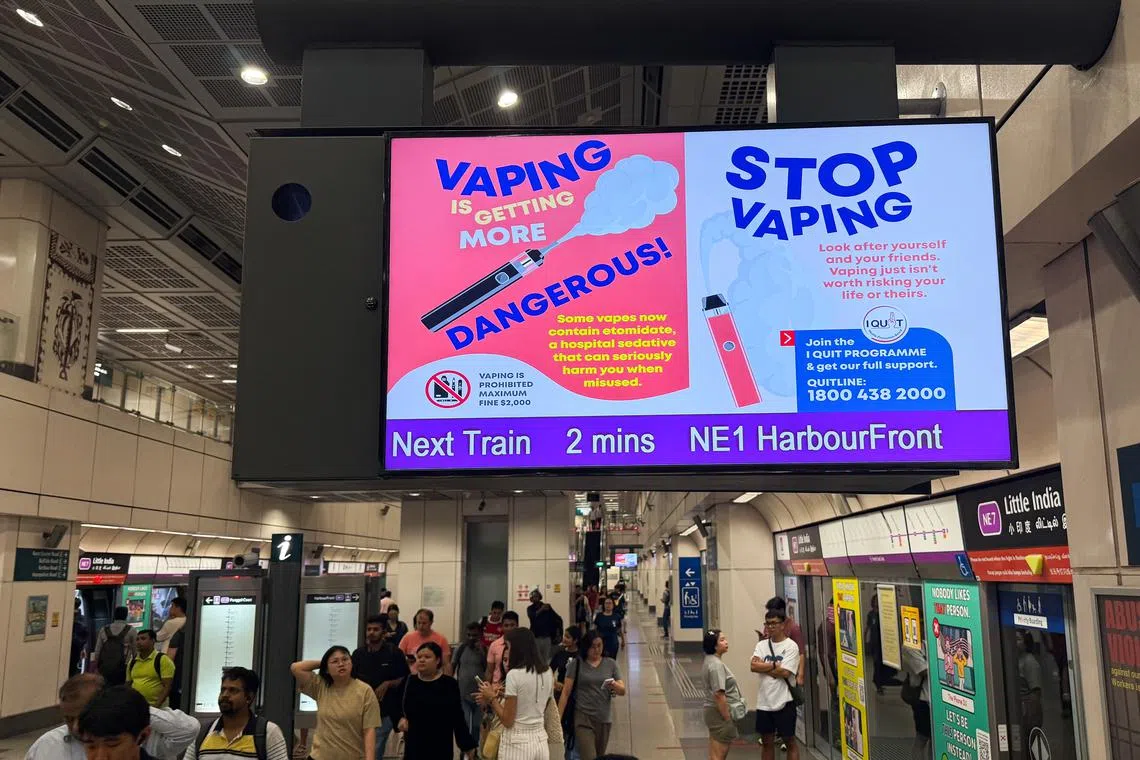Singapore’s tough stance on vapes draws mixed response amid surge in youth vaping overseas
Sign up now: Get ST's newsletters delivered to your inbox

Singapore’s recent clampdown on vaping has seen a mixed response from those overseas.
ST PHOTO: SHINTARO TAY
Follow topic:
- Singapore's clampdown on vaping, including classifying etomidate as a Class C drug, has received mixed international reactions.
- Malaysia's health experts support Singapore's ban, urging similar measures. Indonesia focuses on controlling drug-laced vape abuse, not bans.
- Lobby group Caphra criticised Singapore's move as "fearmongering," prompting the Home Affairs Minister to label them "pushers of tobacco".
AI generated
SINGAPORE – Countries where vapes are allowed are seeing a surge in youth vaping, with health experts calling for more to be done to deal with the problem.
Singapore’s recent clampdown, however, has seen a mixed response from those overseas.
While health experts in Malaysia have lauded the move and urged lawmakers in the country to follow suit, a lobby group based in New Zealand has criticised it as “fearmongering”.
Singapore announced on Aug 17 that it would toughen its stance on vaping and treat it as a drug issue
It then implemented stricter measures
Anaesthetic agent etomidate, which is being abused through vapes known as Kpods, has also been classified as a Class C drug
Health experts and activists in Malaysia have called on the local authorities to look into taking a similar stance to Singapore’s
A survey by the Consumers’ Association of Penang found that the number of cigarette smokers in Malaysia was decreasing, but the use of vapes among students and young people was increasing daily.
The association called for a total ban on vaping in Malaysia, citing public health concerns.
While vaping has been banned in Singapore since 2018, laws and regulations in Malaysia differ from state to state, with inconsistencies between state and federal laws
While federal laws focus on regulating the content of vapes, states such as Johor and Penang have introduced restrictions on licensing and advertising, and Terengganu banned vape sales from August.
Malaysian health experts in August urged lawmakers to take firmer action against vaping in the light of the threat to public health and dangers of such devices being used for drug abuse.
In Indonesia, the National Narcotics Board (BNN) said that unlike Singapore, the country will not be banning vapes. The BNN chief then, Mr Marthinus Hukom, said it would instead focus on controlling the abuse of vape liquid containing drugs, adding that moves to strengthen supervision were not meant to disrupt vape businesses.
According to global data firm Statista, vape revenue in Indonesia is expected to reach almost US$450 million (S$578 million) in 2025.
An official in Batam last week said Singapore’s anti-vaping measures may even benefit tourism
Following Singapore’s announcement of the clampdown, the Philippine embassy here issued an advisory warning Filipinos not to purchase vapes or attempt to bring them into Singapore.
In Europe, the International Business Times UK published a health article
It noted that while Britain’s approach is regulation over prohibition, there has been a continued rise in youth vaping, with calls by some MPs for stricter controls.
Britain banned the sale of disposable vapes in June, citing sharp increases in youth vaping
The move came after Belgium in January became the first country in the European Union to ban disposable vapes
Similarly, Australia implemented further restrictions on vape sales

However, a New Zealand-based advocacy group, Coalition of Asia Pacific Tobacco Harm Reduction Advocates (Caphra), issued a statement on Aug 18 saying Singapore’s anti-vaping policy is regressive and that it “abandons science for fearmongering”.
In response, Singapore’s Home Affairs Minister K. Shanmugam hit back on Aug 30
He told the media that Caphra is a lobby group linked to a tobacco company, and that it promotes the use of vapes under the banner of tobacco harm reduction.
“You can put whatever label you like, but they are basically pushers of tobacco,” Mr Shanmugam said.
“This is a kind of snake oil that these organisations peddle, and they avoid saying it is harmful in itself.”


